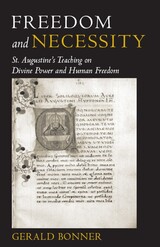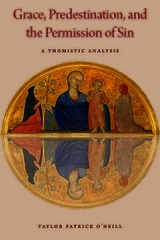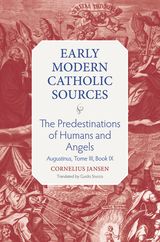4 books about Predestination

Freedom and Necessity
St. Augustine's Teaching on Divine Power and Human Freedom
Gerald Bonner
Catholic University of America Press, 2007
This book seeks to explain this paradox in Augustine's theology by tracing how these different emphases arose in his thought, and speculating as to why he endorsed, in the end, his theology of predestination. T
[more]

Grace, Predestination, and the Permission of Sin
A Thomistic Analysis
Taylor O'Neill
Catholic University of America Press, 2019
Grace, Predestination, and the Permission of Sin seeks to analyze a revisionist movement within Thomism in the 20th century over and against the traditional or classical Thomistic commentatorial treatment of physical premotion, grace, and the permission of sin, especially as these relate to the mysteries of predestination and reprobation. The over-arching critique leveled by the revisionists against the classic treatment is that Bañezian scholasticism had disregarded the dissymmetry between the line of good (God's causation of salutary acts) and the line of evil (God's permission of defect and sin). The teaching of St. Thomas is explored via intimate consideration of his texts. The thought of St. Thomas is then compared with the work of Domingo Bañez and the foremost 'Bañezian' of the 20th century, Reginald Garrigou-Lagrange. The work then shifts to a consideration of the major players of the revisionist treatment, including Francisco Marín-Sola, Jacques Maritain, and Bernard Lonergan. Jean-Herve Nicolas is also taken up as one who had held both accounts during his lifetime. The work analyzes and critiques the revisionist theories according to the fundamental tenets of the classical account. Upon final analysis, it seeks to show that the classical account sufficiently distances God's causal role in regard to free salutary acts and His non-causal role in regard to free sinful acts. Moreover, the revisionist account presents significant metaphysical problems and challenges major tenets of classical theism, such as the divine omnipotence, simplicity, and the exhaustive nature of divine providence. Finally, the implications of the traditional view are considered in light of the spiritual life. It is argued that the classical account is the only one which provides an adequate theological foundation for the Church's robust mystical and spiritual tradition, and in particular, the abandonment to divine providence.
[more]

Pensees
Blaise Pascal
Catholic University of America Press, 2021
Blaise Pascal (1623-1662) was a French mathematician, physicist, and religious philosopher, who laid the foundation for the modern theory of probabilities. The Pensées are made up of some 800 fragments, that have proven to be an enduring masterpiece since their initial publication in 1670.
This volume is a translation of Philippe Sellier’s edition of Pascal’s Pensées, in addition to two shorter texts, the Exchange with M. de Sacy and The Life of Monsieur Pascal by Pascal’s sister, Gilberte Périer. In addition to a Preface and an Introduction, there is a comprehensive apparatus criticus. The text was originally produced by a team of international Pascal scholars, who translated individual sections and was revised by the General Editor. The introduction situates the Sellier edition in the history of Pascal scholarship and highlights the advance its reordering of the fragments and of the folders or bundles represents, both the translation itself and the notes allow for a deeper reading of the text. It not only gives English readers a version of the authoritative Sellier edition of the collection of reflections known as The Pensées, it also proposes material which help assess the philosopher’s significance and the originality of his thought.
On the whole, this translation gives a comprehensive view of the progress of Pascal’s intended Apology of the Christian Religion as well as of other writings on related topics. It also provides today’s readers with a challenging set of arguments, prayer, and quotations from Scripture, and even the record of a mystical experience, known as the Memorial. It highlights all facets of Pascal’s genius, his familiarity with Scripture combined with a talent for controversy, irony mixed with fervor, and altogether the production of an intriguing and challenging writer and thinker.
[more]

The Predestination of Humans
Augustinus, Tome III, Book IX
Cornelius Jansen
Catholic University of America Press, 2022
No other theological text polarized the early modern Catholic world as much as Cornelius Jansen's Augustinus. In it the erudite bishop not only reconstructed St. Augustine's teaching on grace and free will, but also boldly claimed that his views were in line with the Council of Trent and the Society of Jesus. For Jansen the latter had marginalized the Church Father's doctrine on divine predestination by overemphasizing human free will. Published after his death in 1640, Jansen's work drew a large crowd of followers and inspired an Augustinian reform movement. Its papal condemnation unintentionally spread this theology, but stifled an impassionate, academic engagement with the Augustinus. This first-ever translation of some of its central chapters enables historians, philosophers and theologians to finally engage with the founding text of Jansenism.
[more]
READERS
Browse our collection.
PUBLISHERS
See BiblioVault's publisher services.
STUDENT SERVICES
Files for college accessibility offices.
UChicago Accessibility Resources
home | accessibility | search | about | contact us
BiblioVault ® 2001 - 2024
The University of Chicago Press









